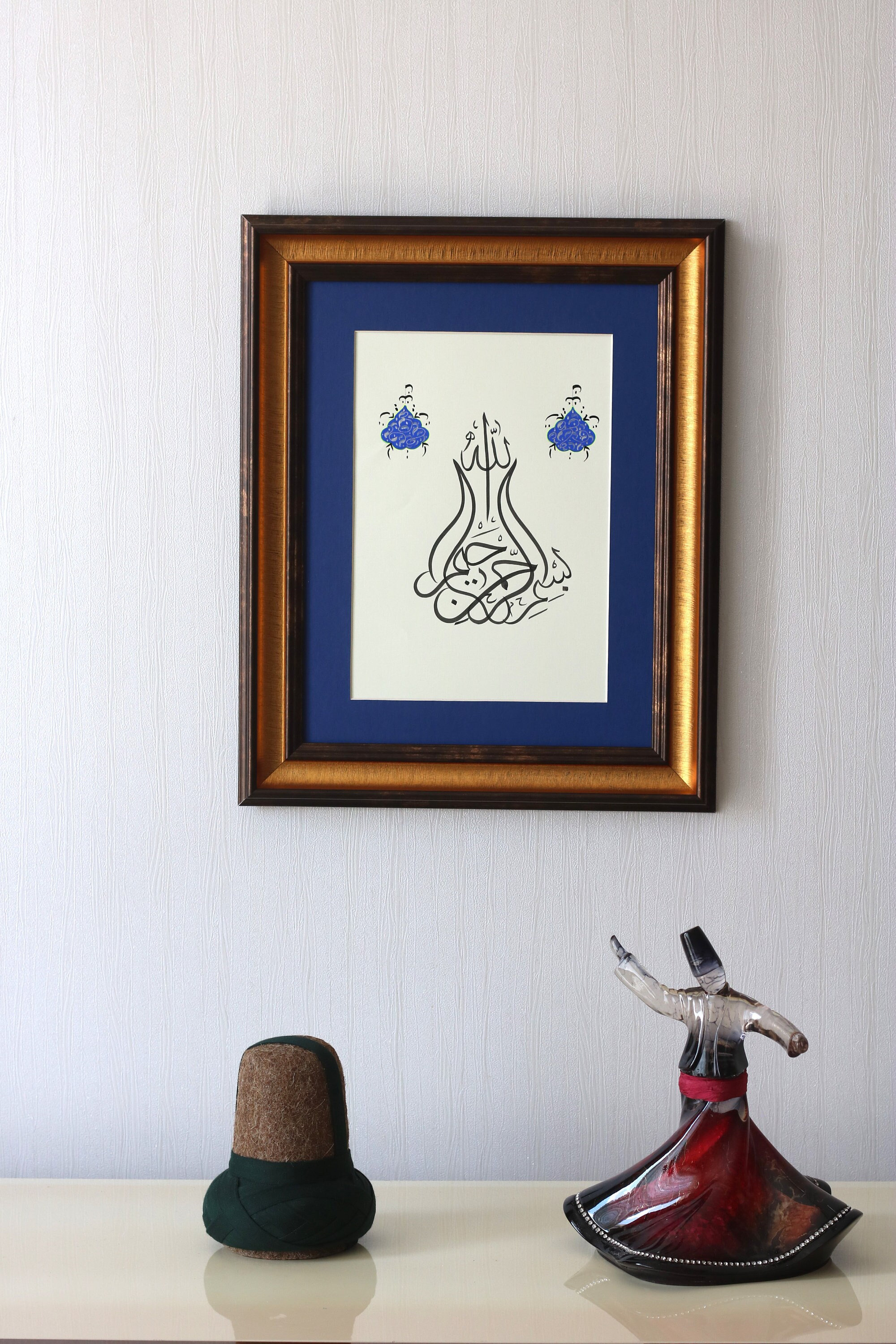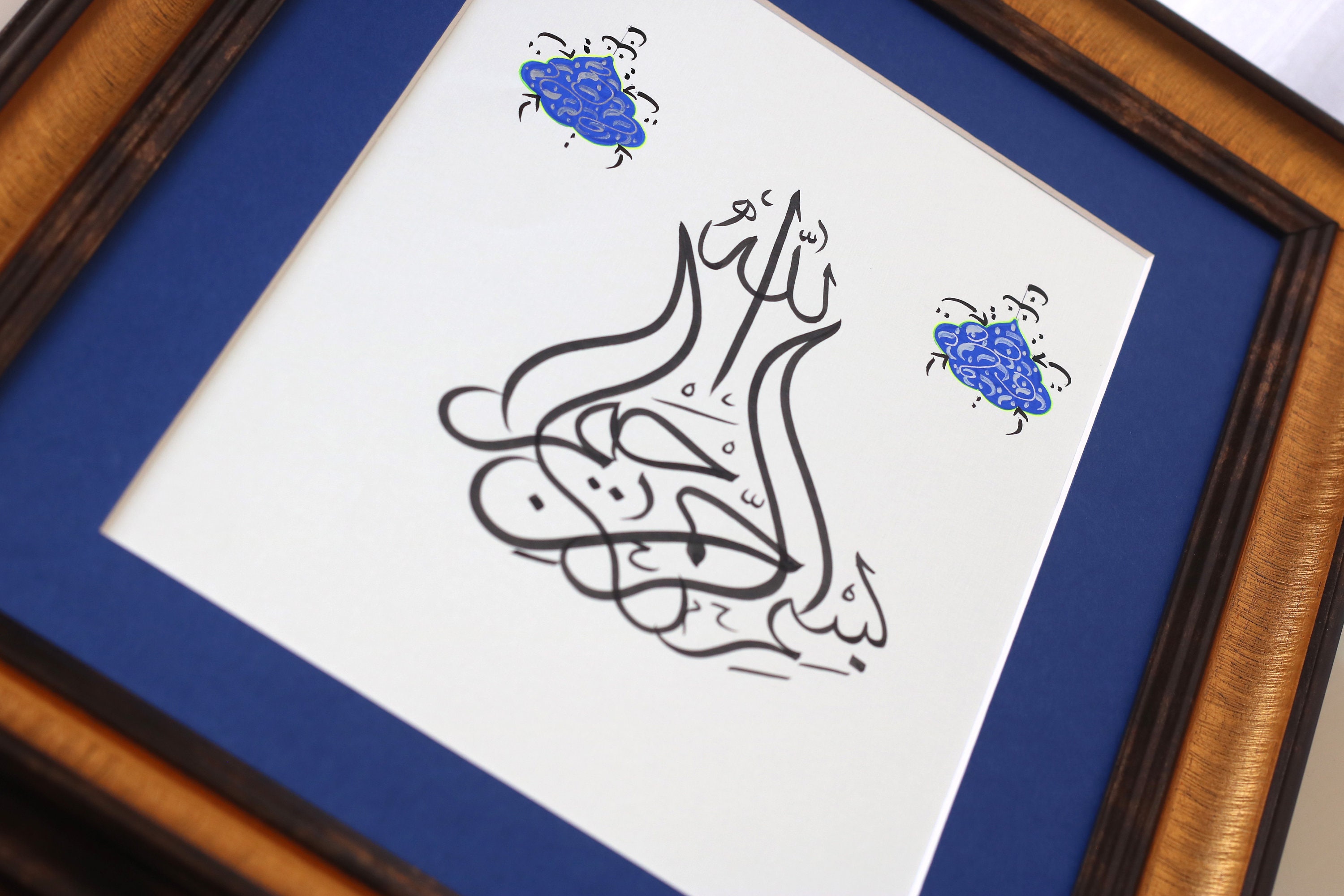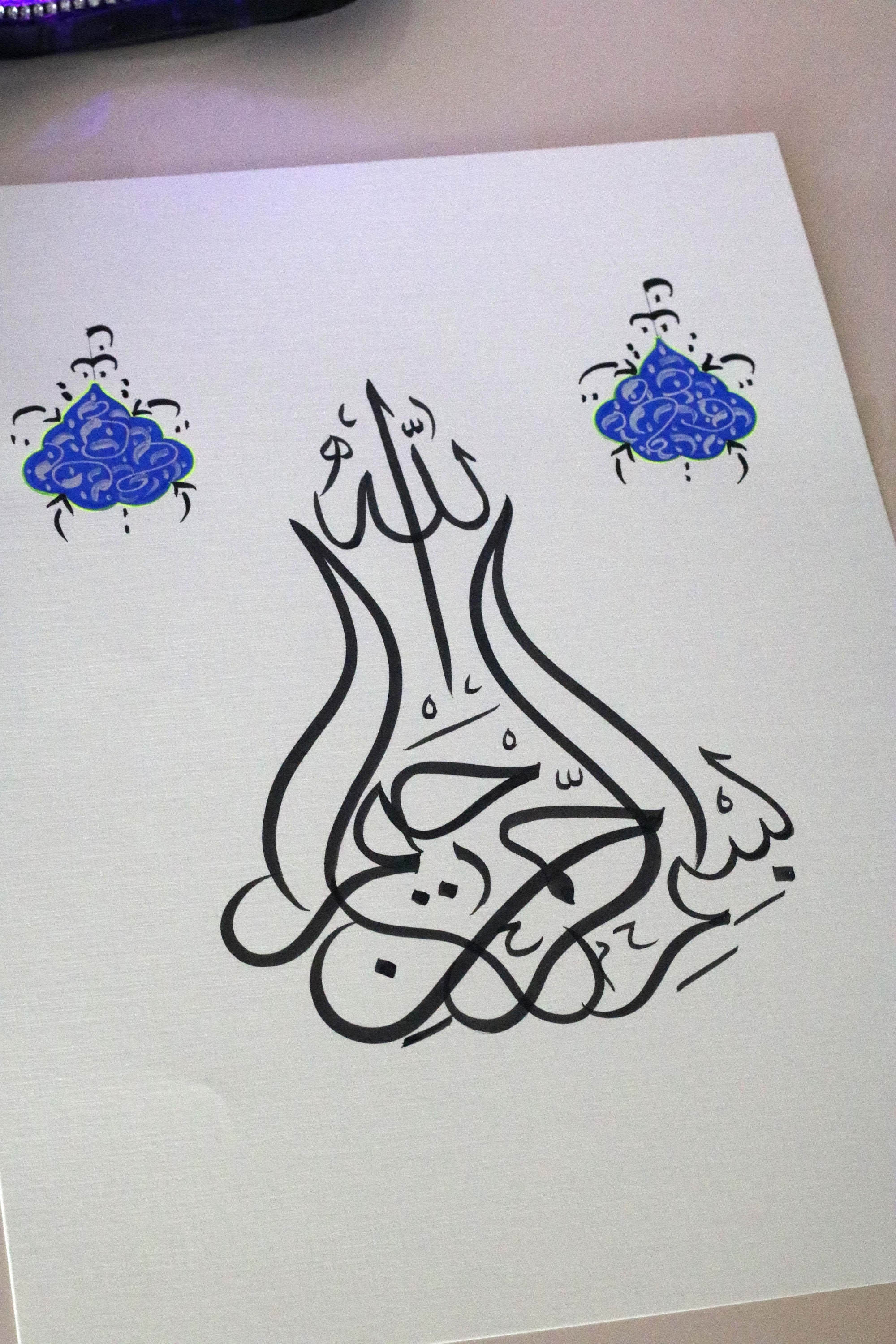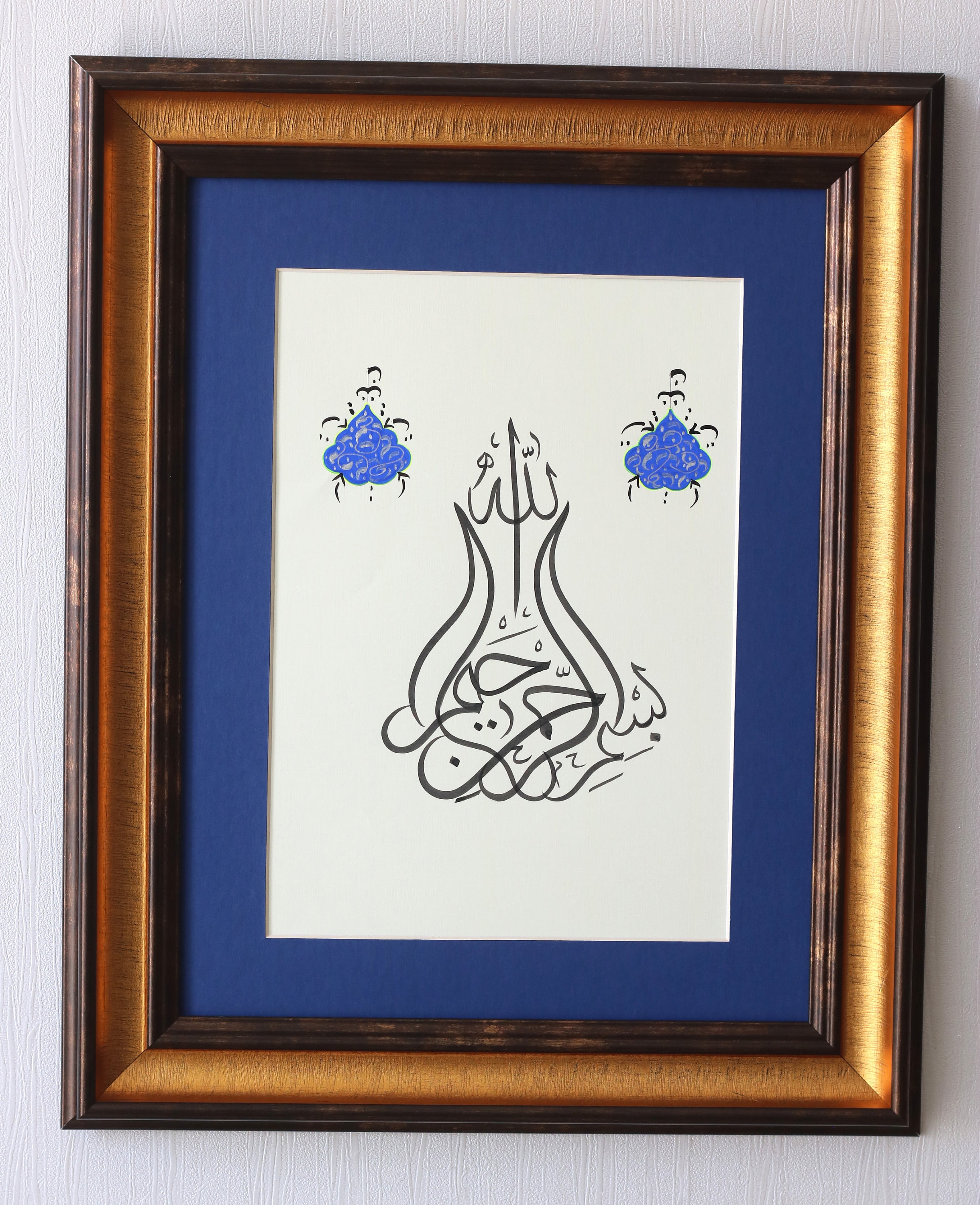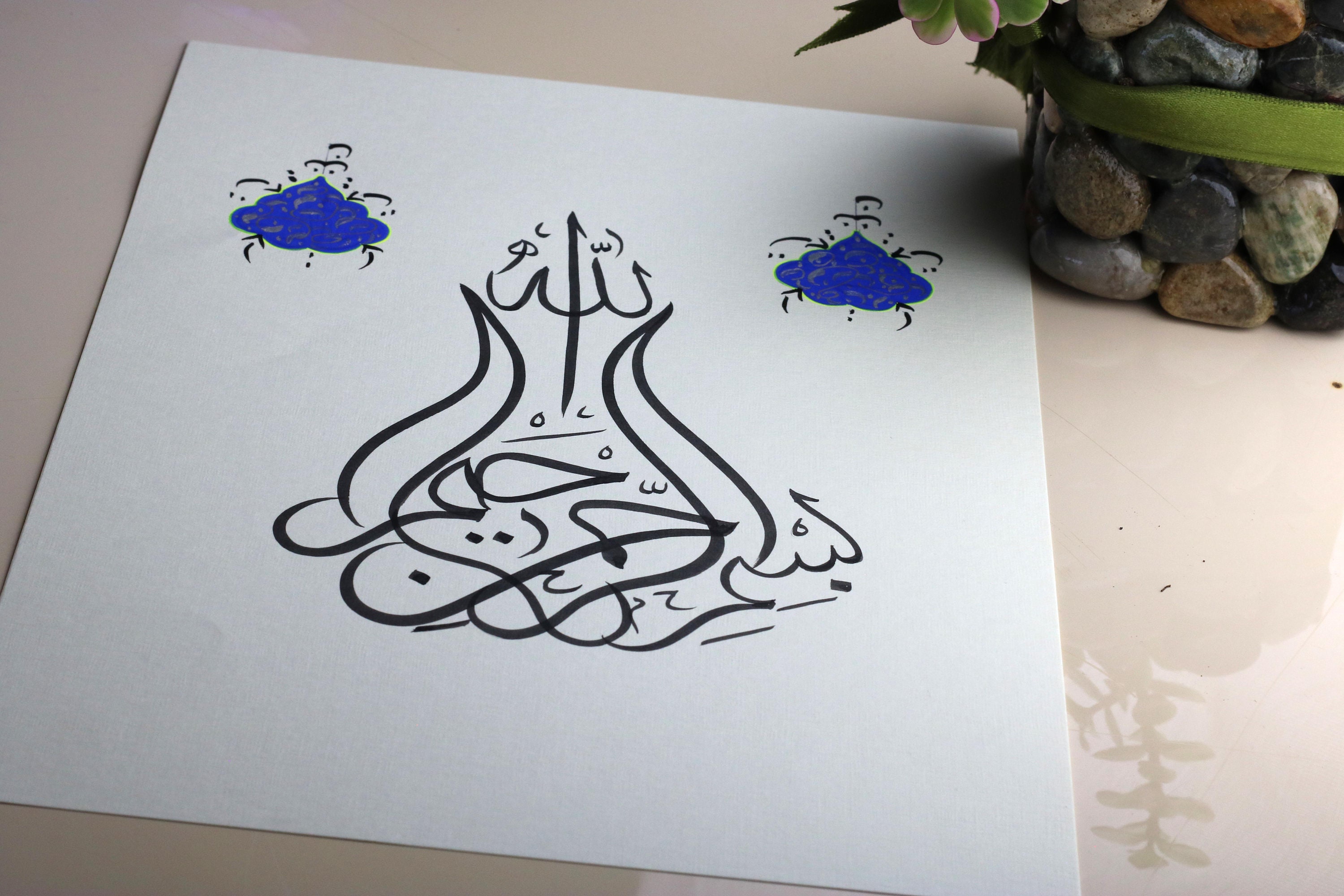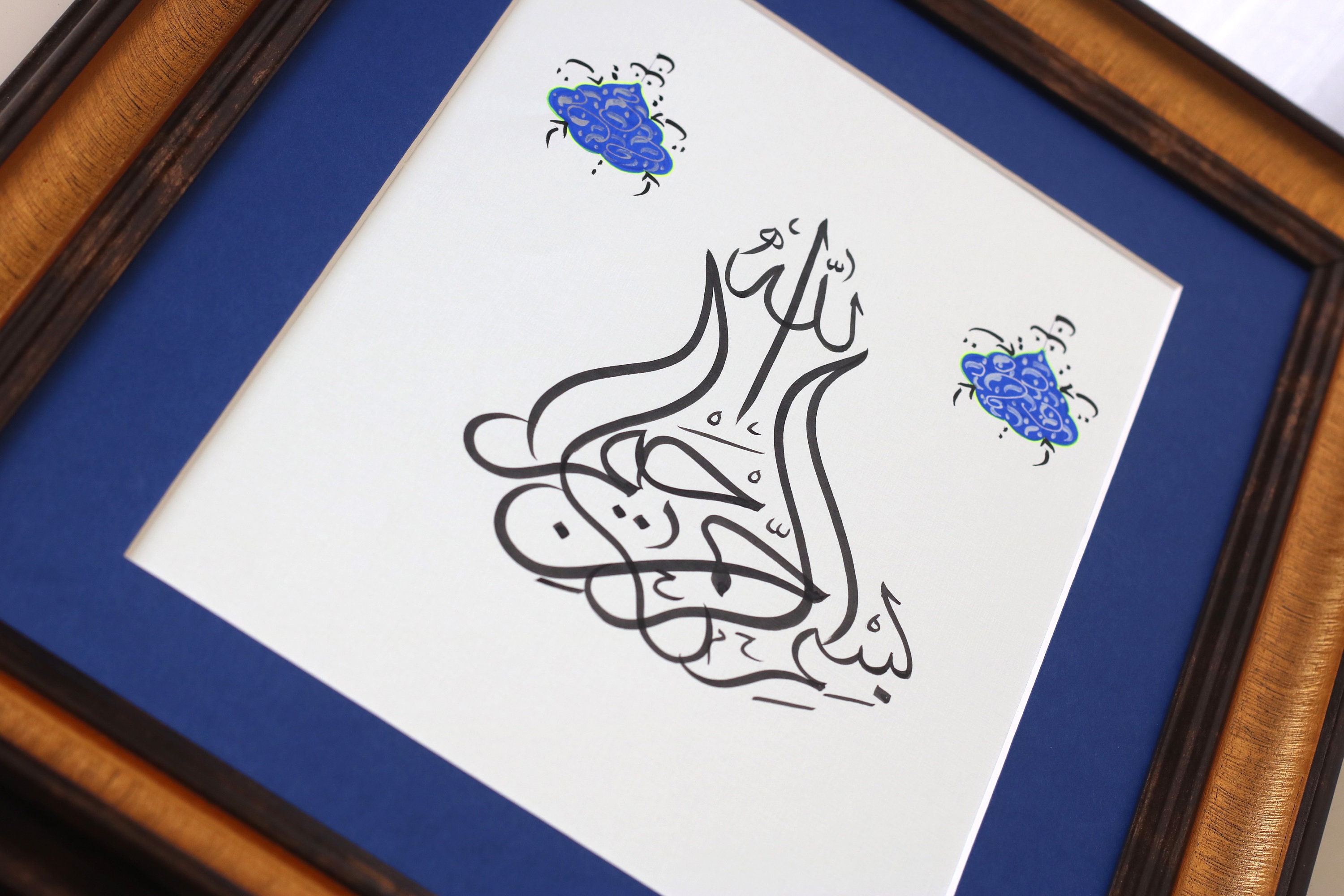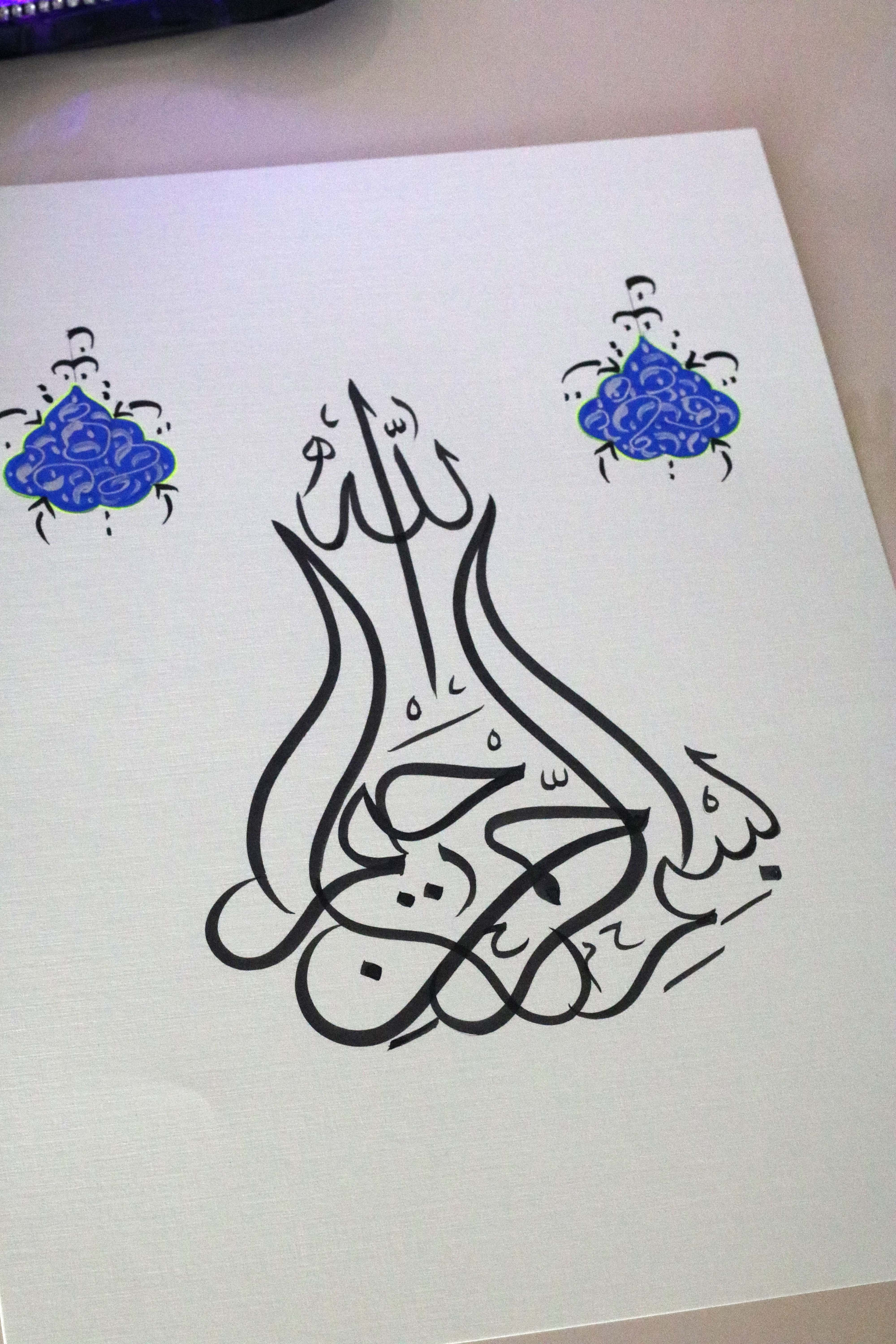Islamic Calligraphy Wall Art Handmade Islamic Gift Art Arabic Basmala IslamicWall Art“Bismillah Hir Rahman Nir Raheem” A4 020010
$89.50
Original Handmade Islamic Calligraphy Wall Art Handmade Islamic Gift Ramadan Gift Art Arabic Calligraphy Hand Painting IslamicWall Art“Bismillah Hir Rahman Nir Raheem”
The painting includes the Arabic calligraphy handwriting of
“Bismillah Hir Rahman Nir Raheem”
بسم الله الرحمن الرحيم
Bismillah (Arabic: بسملة) is an Arabic noun used as a collective name for the whole of the recurring Islamic phrase b-ismi-llāh r-raḥmān r-raḥīm. It is sometimes translated as "In the name of God, the Most Gracious, the Most Merciful".
What does Bismillah mean?
When one says “Bismillah ” when starting to do anything, what that means is, “I start this action accompanied by the name of Allah or seeking help through the name of Allah, seeking blessing thereby. Allah is God, the beloved and worshipped, to Whom hearts turn in love, veneration and obedience (worship). He is al-Rahman (the Most Gracious) Whose attribute is vast mercy; and al-Rahim (the Most Merciful) Who causes that mercy to reach His creation.
It was said that what this means is: I start this action by mentioning the name of Allah.
Ibn Jarir (may Allah have mercy on him) said:
“Allah, may He be exalted and His name sanctified, taught His Prophet Muhammad (peace and blessings of Allah be upon him) proper manners by teaching him to mention His most beautiful names before all his actions. He commanded him to mention these attributes before starting to do anything, and made what He taught him a way for all people to follow before starting anything, words to be written at the beginning of their letters and books. The apparent meaning of these words indicates exactly what is meant by them, and it does not need to be spelled out.”
There is something omitted in the phrase “Bismillah” when it said before starting to do something, which may be “I begin my action in the name of Allah,” such as saying, “In the name of Allah I read”, “In the name of Allah I write”, “In the name of Allah I ride”, and so on. Or, “My starting is in the name of Allah”, “My riding is in the name of Allah”, “My reading is in the name of Allah”, and so on. It may be that blessing comes by saying the name of Allah first, and that also conveys the meaning of starting only in the name of Allah and not in the name of anyone else.
The name of Allah is the greatest name and is so well known as to need no explanation; this is a name that belongs exclusively to the Creator and no one else. The correct view is that it is derived from the root ilah. He is God (ilah) which means that He is worshipped and is divine.
Al-Rahman is one of the names of Allah that belong exclusively to Him. It means the One Who possesses vast mercy, because this form (fa’lan) is indicative of fullness and abundance. It is the most exclusive name of Allah after His name Allah, just as mercy is His most exclusive attribute. Hence this name (al-Rahman) often appears after the name Allah, as in the ayah (interpretation of the meaning):
“Say (O Muhammad): Invoke Allah or invoke the Most Gracious [al-Rahman] (Allah)” [al-Isra 17:110]
Al-Rahim is also one of the names of Allah, and means the One Who causes His mercy to reach those whom He wills among His slaves.
Ibn al-Qayyim (may Allah have mercy on him) said:
“Al-Rahman refers to an attribute that is connected to Allah and is part of His Essence, and al-Rahim refers to a connection with the one to whom mercy is shown. The former is adjectival (referring to what He is) and the latter is verbal (referring to what He does). The former indicates that mercy is His attribute, and the latter indicates that He bestows His mercy upon His creation. If you want to understand this then ponder the meaning of these verses (interpretation of the meanings):
“And He is Ever Most Merciful (Rahim) to the believers”[al-Ahzab 33:43]
“Certainly, He is unto them full of kindness, Most Merciful (Rahim)” [al-Tawbah 9:117]
The word al-Rahman is never used in this context. So we know that the word Rahman means the One Whose attribute is mercy (rahmah), and al-Rahim is the One Who bestows His mercy.” (Badai’ al-Fawaid, 1/24)
Saying the Basmalah when reading the Quran
The ruling on saying the Basmalah before reading Quran depends on the situation:
If it is at the beginning of a surah – apart from Surat Bara-ah (al-Tawbah) – then the majority of imams have stated that “it is mustahabb to recite the Basmalah at the beginning of each surah, in prayer or otherwise.
This should be done as a regular practice, and some of them considered that a reading of the whole Quran is incomplete if the Basmalah was not recited at the beginning of every surah apart from Bara-ah (al-Tawbah).” When Imam Ahmad (may Allah have mercy on him) was asked about reciting it at the beginning of every surah, he said, “Do not neglect it.”
If one is starting in the middle of a surah – which is the case asked about in the question – then the majority of scholars and Quran readers say that there is no reason why one should not start with it.
It was said to Imam Ahmad, after he had said that it should not be omitted at the beginning of the surah, “What if a person starts reading part way through a surah?” He said, “There is nothing wrong [with saying the Basmalah].” Al-Abadi narrated that al-Shafi’i (may Allah have mercy on him) regarded it as mustahabb (to say the Basmalah, when starting to recite) part way through a surah.
The Quran readers said: It is certain that one should say the Basmalah if the ayah which will be read after saying it contains a pronoun that refers to Allah, such as the verses (interpretation of the meanings):
“To Him (Alone) is referred the knowledge of the Hour” [Fussilat 41:47]
“And it is He Who produces gardens” [al-An’am 6:141] because otherwise, if one recites these verses after seeking refuge with Allah from the Shaytan, the pronoun may appear to refer to the Shaytan which would convey an abhorrent meaning.
Reciting the Basmalah at the beginning of Surat Bara-ah (al-Tawbah); there is hardly any dispute among the scholars that doing this is makruh (disliked).
Salih said concerning some issues that he narrated from his father Ahmad (may Allah have mercy on him): “I asked him about Surah al-Anfal and Surat al-Tawbah, whether it is permissible for a man to separate them by saying Bismillah al-Rahman al-Rahim. My father said: ‘With regard to the Quran, reference should be made to what the Companions of the Messenger of Allah (peace and blessings of Allah be upon him) were agreed on; nothing should be added to or taken away from that.’”
Reciting it part way through Surat al-Bara-ah (al-Tawbah) . The Quran readers differed concerning that, as was narrated by Ibn Hajar al-Haythami in al-Fatawa al-Fiqhiyyah (1/52), and he said: “Among the leading Quran readers, al-Sakhawi said that there is no dispute that it is Sunnah to start with the Basmalah when one starts reading part way through this surah [al-Tawbah], as he differentiated between starting at the beginning and starting in the middle, but his explanation was facile and was refuted by al-Ja’bari from among the Quran readers. This is more likely (i.e., the view that it is makruh is more likely to be correct), because the reason why the Basmalah should not be recited at the beginning (of al-Tawbah) is that it came with the sword (i.e., the command to fight the kuffar) and it exposes the hypocrites and their foul deeds in a manner that is not unlike any other surah, and this theme is repeated throughout Surat al-Tawbah. Therefore it is not prescribed to recite the Basmalah even if one starts reciting part way through this surah, just as it is not prescribed at the beginning, for the reasons we have established.”
See al-Adab al-Shar’iyyah by Ibn Muflih, 2/325; al-Mawsu’ah al-Fiqhiyyah, 13/253; al-Fatawa al-Fiqhiyyah al-Kubra, 1/52
This painting is an outstanding piece of art. It is a special handmade / hand painting item. The listing does not include any digital printing items. The painting is made over 200 gr special calligraphy paper.
The seizes of the work are;
Unframed seizes
20.4 cm x 28cm / 8.03” x 11.02”
Framed seizes
42 cm x 32 cm / 16.53” x 12.59”
The painting will be sent with its frame, ready for hanging on the wall. It is well packed and under the guarantee of Original Islamic Calligraphy Handmade Anatolian Arts until the arrival at your address.
The item will be shipped once the payment process is completed. The shipping time is within 5 days (generally 3) within Europe and US.
You are responsible for all duty, customs or VAT charges, or any other charges imposed by your country. Please check with your customs office to determine the amount you could be charged before placing order.
All of my pieces are wellpacked to ensure their safe arrival. I will gladly replace or refund any item that should be broken or lost in transit.
All of our products are under the gurantee of Original Islamic Calligraphy Handmade Anatolian Arts. For any reason of disapproving the item, you are kindly asked to ship the item back. The shipping cost shall be covered by the buyer.
Please feel free to ask me any questions you may have in advance of purchase.
Returns & Exchanges
I gladly accept returns and exchanges
Just contact me within: 14 days of delivery
Ship items back to me within: 30 days of delivery
I don't accept cancellations
But please contact me if you have any problems with your order.
The following items can't be returned or exchanged
Because of the nature of these items, unless they arrive damaged or defective, I can't accept returns for:
- Custom or personalized orders
- Perishable products (like food or flowers)
- Digital downloads
- Intimate items (for health/hygiene reasons)
Privacy
This Privacy Policy describes how and when I collect, use, and share information when you purchase an item from me, contact me, or otherwise use my services through Etsy.com or its related sites and services.
1. Information I Collect
To fulfill your order, you must provide me with certain information (which you authorized Etsy to provide to me), such as your name, email address, postal address, payment information, and the details of the product that you’re ordering. You may also choose to provide me with additional personal information (for a custom order of jewelry, for example), if you contact me directly.
2. The legal bases he relies on to collect, use, and share personal information
Why I Need Your Information and How I Use It
as needed to provide my services, such as when I use your information to fulfill your order, to settle disputes, or to provide customer support;
when you have provided your affirmative consent, which you may revoke at any time, such as by signing up for my mailing list;
if necessary to comply with a legal obligation or court order or in connection with a legal claim, such as retaining information about your purchases if required by tax law; and as necessary for the purpose of my legitimate interests, if those legitimate interests are not overridden by your rights or interests, such as 1) providing and improving my services. I use your information to provide the services you requested and in my legitimate interest to improve my services; and 2) Compliance with the Etsy Seller Policy and Terms of Use. I use your information as necessary to comply with my obligations under the Etsy Seller Policy and Terms of Use.
3. Information Sharing and Disclosure
I share your personal information for very limited reasons and in limited circumstances, as follows:
I share information with Etsy as necessary to provide you my services and comply with my obligations under both the Etsy Seller Policy and Etsy Terms of Use.
Service providers. I engage certain trusted third parties to perform functions and provide services to my shop, such as delivery companies. I will share your personal information with these third parties, but only to the extent necessary to perform these services.
Business transfers. If I sell or merge my business, I may disclose your information as part of that transaction, only to the extent permitted by law.
Compliance with laws. I may collect, use, retain, and share your information if I have a good faith belief that it is reasonably necessary to: (a) respond to legal process or to government requests; (b) enforce my agreements, terms and policies; (c) prevent, investigate, and address fraud and other illegal activity, security, or technical issues; or (d) protect the rights, property, and safety of my customers, or others.
4. Data Retention
I retain your personal information only for as long as necessary to provide you with my services and as described in my Privacy Policy. However, I may also be required to retain this information to comply with my legal and regulatory obligations, to resolve disputes, and to enforce my agreements. I generally keep your data for the following time period: 4 years.
5. Transfers of Personal Information Outside the EU
I may store and process your information through third-party hosting services in the US and other jurisdictions. As a result, I may transfer your personal information to a jurisdiction with different data protection and government surveillance laws than your jurisdiction. If I am deemed to transfer information about you outside of the EU, I rely on Privacy Shield as the legal basis for the transfer, as Google Cloud is Privacy Shield certified.
6. Your Rights
If you reside in certain territories, including the EU, you have a number of rights in relation to your personal information. While some of these rights apply generally, certain rights apply only in certain limited cases. I describe these rights below:
Access. You may have the right to access and receive a copy of the personal information I hold about you by contacting me using the contact information below.
Change, restrict, delete. You may also have rights to change, restrict my use of, or delete your personal information. Absent exceptional circumstances (like where I am required to store data for legal reasons) I will generally delete your personal information upon request.
Object. You can object to (i) my processing of some of your information based on my legitimate interests and (ii) receiving marketing messages from me after providing your express consent to receive them. In such cases, I will delete your personal information unless I have compelling and legitimate grounds to continue using that information or if it is needed for legal reasons.
Complain. If you reside in the EU and wish to raise a concern about my use of your information (and without prejudice to any other rights you may have), you have the right to do so with your local data protection authority.
How to Contact Me
For purposes of EU data protection law, I, Huseyin OZTURK, am the data controller of your personal information. If you have any questions or concerns, you may contact me at ozturkhuseyin28@yahoo.com.
